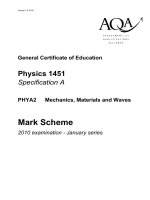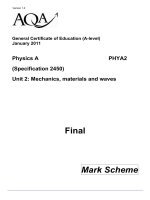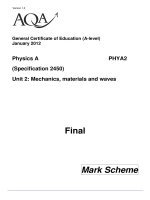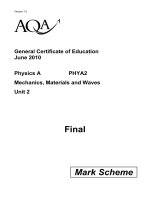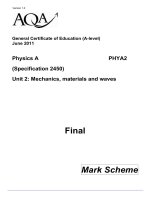AQA ANTH4 w MS JUN14
Bạn đang xem bản rút gọn của tài liệu. Xem và tải ngay bản đầy đủ của tài liệu tại đây (145.33 KB, 18 trang )
A-LEVEL
ANTHROPOLOGY
ANTH4/Unit 4 Practising Anthropology: Methods and Investigations
Mark scheme
2111
June 2014
Version: 1.0 Final
Mark schemes are prepared by the Lead Assessment Writer and considered, together with the
relevant questions, by a panel of subject teachers. This mark scheme includes any amendments
made at the standardisation events which all associates participate in and is the scheme which was
used by them in this examination. The standardisation process ensures that the mark scheme covers
the students’ responses to questions and that every associate understands and applies it in the same
correct way. As preparation for standardisation each associate analyses a number of students’
scripts: alternative answers not already covered by the mark scheme are discussed and legislated for.
If, after the standardisation process, associates encounter unusual answers which have not been
raised they are required to refer these to the Lead Assessment Writer.
It must be stressed that a mark scheme is a working document, in many cases further developed and
expanded on the basis of students’ reactions to a particular paper. Assumptions about future mark
schemes on the basis of one year’s document should be avoided; whilst the guiding principles of
assessment remain constant, details will change, depending on the content of a particular
examination paper.
Further copies of this Mark Scheme are available from aqa.org.uk
Copyright © 2014AQA and its licensors. All rights reserved.
AQA retains the copyright on all its publications. However, registered schools/colleges for AQA are permitted to copy material from this
booklet for their own internal use, with the following important exception: AQA cannot give permission to schools/colleges to photocopy any
material that is acknowledged to a third party even for internal use within the centre.
MARK SCHEME – A-LEVEL ANTHROPOLOGY – ANTH4 – JUNE 2014
QUALITY OF WRITTEN COMMUNICATION
Where students are required to produce extended written material in English, the scheme of
assessment must make specific reference to the assessment of the quality of written
communication. Students must be required to:
•
•
•
ensure text is legible, and spelling, grammar and punctuation are accurate, so that meaning is
clear
select and use a form and style of writing appropriate to purpose and complex subject matter
organise relevant information clearly and coherently, using specialist vocabulary when
appropriate.
The assessment criteria for quality of written communication apply to the assessment of the 20
mark questions. The following criteria should be applied in conjunction with the mark scheme.
The quality of written communication bands must be regarded as integral to the appropriate mark
scheme band even though they are listed separately in the mark scheme. Examiners should note
that, in the assessment of students’ anthropological knowledge and skills, the assessment of the
Quality of Written Communication will be judged through the assessment of the clarity and
appropriateness of the anthropological material presented.
For 20 mark questions:
In the 1 – 7 band, students’ answers are likely to be characterised by the poor logical expression
of ideas and the use of a limited range of conceptual terms, perhaps often used imprecisely and/or
inaccurately. Spelling, punctuation and grammar may show serious deficiencies and frequent
errors, perhaps impairing the intelligibility of significant parts of the answer.
In the 8 – 15 band, students’ answers are likely to be characterised by the fair to good logical
expression of ideas and the competent use of a reasonable range of conceptual terms. Spelling,
punctuation and grammar will be of a reasonable standard. Commonly used words and
anthropological terms will generally be spelt correctly. There may be minor errors of punctuation
and grammar, but these will not seriously impair the intelligibility of the answer.
In the 16 – 20 band, students’ answers are likely to be characterised by the very good to excellent
logical expression of ideas and the precise use of a broad range of conceptual terms. Spelling,
punctuation and grammar will be of a very good to excellent standard. Commonly and less
commonly used words and anthropological terms will almost always be spelt correctly.
Punctuation and grammar will be used correctly throughout to facilitate the intelligibility of the
answer.
INDICATIVE CONTENT AND RESEARCH IN THE MARK SCHEMES
Please note that any of the indicative content and research that is presented in the mark bands of
the higher mark questions may be present in any of the mark bands, not solely the higher band.
3 of 18
MARK SCHEME – A-LEVEL ANTHROPOLOGY – ANTH4 – JUNE 2014
Section A: Research Issues
Total for this section: 40 marks
0
1
Examine some of the advantages of anthropologists reflecting upon their own role in
fieldwork.
(10 marks)
0
No relevant points.
1-3
Answers in this band will show only limited knowledge and understanding and
show very limited interpretation, application, analysis and evaluation.
Lower in the band, there may be one or two insubstantial points about
reflecting on fieldwork but these will be ineffectively used. There will be minimal
or no interpretation, application, analysis and evaluation.
Higher in the band, answers will present one or two insubstantial points about
reflecting on field work. There will be very limited interpretation, application,
analysis and evaluation.
4-7
Answers in this band will show reasonable knowledge and understanding, and
show limited interpretation, application, analysis and evaluation.
Lower in the band, material on one or more advantages of reflecting on
fieldwork will be identified and some limited explanation will be offered, for
example, being aware of one’s own biases. Some reasonable knowledge and
understanding will be shown, though interpretation, application, analysis and
evaluation are likely to be limited.
Higher in the band, material on two or more advantages of reflecting on
fieldwork during will be presented, and some explanation offered, for example
an ethnographic example to illustrate how the anthropologist may become
more open to different interpretations of the data as a result of reflection.
Reasonable knowledge and understanding will be shown, and interpretation
and application will begin to meet the demands of the question. Students may
begin to offer some analysis and/or evaluation.
8-10
Answers in this band will show sound and detailed knowledge and
understanding of material on two or more advantages of reflecting on fieldwork.
The material will be accurately interpreted and applied to the demands of the
question. Students will show the ability to organise material and to analyse
and/or evaluate it explicitly, so as to produce a coherent and relevant answer.
Lower in the band, answers may analyse a more limited range of material.
Interpretation and application may be less focused, and analysis and/or
evaluation less developed.
Higher in the band, answers will be more detailed and complete with a wider
range of material. Interpretation and application of material will be more
focused and answers will show sensitivity in interpretation of the question.
Analysis and/or evaluation will be more relevant and explicit.
4 of 18
MARK SCHEME – A-LEVEL ANTHROPOLOGY – ANTH4 – JUNE 2014
Issues, concepts and theories such as the following may appear:
•
•
•
•
•
•
•
•
•
definition of reflecting, eg self-consciousness or awareness of the role of
the researcher in the research process
- may use the concept of reflexivity
helps the researcher adopt a more ethical approach, eg. being aware of
the impact the researcher may have on the lives of the researchers or
becoming more sensitive to the needs and interests of the research
participants
helps to gain more accurate data, eg being aware of how one’s own
biases may affect the interpretation of results
helps to gain insights into the subjective nature of knowledge production,
eg the role of power
attention paid to the interactional processes and the interdependence of
fieldworker and research participants (Rabinow)
the power relationship between fieldworker and research participant
acknowledge fieldworker’s own role (Barley)
gives the future reader of the ethnography a way of evaluating the findings
of the researcher
knowledge of specific examples to illustrate the points made.
Note: However, not all of these are necessary, even for full marks.
Students may show interpretation, application, analysis and evaluation by
reference to issues such as:
•
•
•
•
•
•
•
•
•
application of points to specific examples of the work of anthropologists
analysis and ‘unpacking’ of concepts, eg emic/etic, objective/subjective
comparisons made between different methods
comparisons made between the work of different anthropologists, eg the
contrast between Malinowski and Weiner in their approach to research
amongst the Trobriand Islanders
awareness of relevant theoretical perspectives on methodology and the
debates between them, eg scientific, interpretivist, Marxist, feminist, postmodern, eg the debate between Chagnon and others over the relationship
of science to anthropological research
relevance to question, eg on reflexivity rather than the problems of
subjectivity or power relations in general
evaluation of theoretical perspectives on methodology
evaluation of specific research methods
evaluation of the work of specific anthropologists, eg feminist critique of
male researchers who aren’t aware of a gender bias.
5 of 18
MARK SCHEME – A-LEVEL ANTHROPOLOGY – ANTH4 – JUNE 2014
0
2
Examine some of the limitations of using oral histories in anthropological research.
(10 marks)
0
No relevant points.
1-3
Answers in this band will show only limited knowledge and understanding and
show very limited interpretation, application, analysis and evaluation.
Lower in the band, there may be one or two insubstantial points about oral
histories in general, but these will be ineffectively used. There will be minimal
or no interpretation, application, analysis and evaluation.
Higher in the band, answers will present one or two insubstantial points about
the limitations of oral histories. There will be very limited interpretation,
application, analysis and evaluation.
4-7
Answers in this band will show reasonable knowledge and understanding, and
show limited interpretation, application, analysis and evaluation.
Lower in the band, material on one or more limitations of using oral histories
will be identified, for example, lack of representativeness and/or generalisation,
and some limited explanation will be offered. Some reasonable knowledge and
understanding will be shown, though interpretation, application, analysis and
evaluation are likely to be limited.
Higher in the band, material on two or more limitations of oral histories will be
presented and some explanation offered, for example, use of a specific
example of the use of an oral history, as opposed to interviews in general.
Reasonable knowledge and understanding will be shown, and interpretation
and application will begin to meet the demands of the question. Students may
begin to offer some analysis/evaluation.
8-10
Answers in this band will show sound and detailed knowledge and
understanding of two or more limitations of oral histories as an anthropological
research method. The material will be accurately interpreted and applied to the
demands of the question. Students will show the ability to organise material
and to analyse and/or evaluate it explicitly, so as to produce a coherent and
relevant answer.
Lower in the band, answers may analyse a more limited range of material.
Interpretation and application may be less focused, and analysis and/or
evaluation less developed.
Higher in the band, answers will be more detailed and complete with a wider
range of material. Interpretation and application of material will be more
6 of 18
MARK SCHEME – A-LEVEL ANTHROPOLOGY – ANTH4 – JUNE 2014
focused and answers will show sensitivity in interpretation of the question.
Analysis and/or evaluation will be more relevant and explicit.
Issues, concepts and theories such as the following may appear:
•
•
•
•
•
•
•
•
•
•
•
•
•
definition of oral histories
lack of validity
lack of reliability
reliance on memory (Shostak, 1981)
unable to generalise
not representative
subjectivity, lying and exaggeration (Peacock and Holland, 1993)
problems with translation and interpretation (Llewellyn-Davies, filming
Masai)
time-consuming
difficulties in recording and transcribing
ethical and political issues
personal characteristics of both research participant/fieldworker
factors that might have impacted on the knowledge of the history eg
colonialism.
Note: However, not all of these are necessary, even for full marks.
Students may show interpretation, application, analysis and evaluation by reference to
issues such as:
•
•
•
•
•
•
•
•
•
application of points to specific examples of the work of anthropologists
(Shostak, 1981)
analysis and ‘unpacking’ of concepts, eg representative (whose history do
we use), generalisation
comparisons made between different methods, eg showing limitations
through contrast with other methods
comparisons made between the work of different anthropologists
awareness of relevant theoretical perspectives on methodology and the
debates between them, eg the views of a scientific approach on oral
histories
relevance to question, eg focus on problems specific to oral histories
rather than interviews in general
evaluation of theoretical perspectives on methodology
evaluation of specific research methods
evaluation of the work of specific anthropologists.
7 of 18
MARK SCHEME – A-LEVEL ANTHROPOLOGY – ANTH4 – JUNE 2014
0
3
‘It is unethical for anthropological research to benefit only the researcher and not the
participants.’
Assess this view, using anthropological arguments and evidence.
(20 marks)
0
No relevant points.
1-7
Answers in this band will show only limited interpretation, application, analysis
or evaluation, and will show only limited knowledge and understanding.
Lower in the band, there may be one or two insubstantial points about the
ethics with little understanding of relevant issues.
Higher in the band, answers will show limited, undeveloped knowledge, for
example two or three insubstantial points about the anthropologist taking
advantage of research participants. Interpretation and application of material
may be simplistic, or at a tangent to the question.
8-15
Answers in this band will show some reasonable interpretation, application,
analysis and/or evaluation and will show reasonable knowledge and
understanding.
Lower in the band, some potentially relevant material will be presented and a
broadly accurate if basic account offered, for example of the problems caused
by anthropologists using participants to make their own career, without
consideration to the negative impacts. Interpretation may be limited and not
applied explicitly to the demands of the question. Analysis and/or evaluation
are likely to be very limited or non-existent.
Higher in the band, knowledge and understanding will be broader and/or
deeper. The answer will begin to identify a wider range of issues, for example
awareness of the efforts of anthropologists to collaborate with participants, with
specific examples from anthropological research. Material will be accurately
interpreted, though its relevance may not always be made explicit. There will
be some limited explicit analysis and/or evaluation.
16-20 In this band, analysis and evaluation will be explicit and relevant,
and answers will show sound and detailed knowledge and understanding of
material on the ethical issues surrounding the question of benefits. This will be
accurately interpreted and applied to the demands of the question. Students
will show the ability to organise material and to analyse and evaluate it
explicitly so as to produce a coherent and relevant answer.
Lower in the band, answers may examine a more limited range of material.
Interpretation and application may be less focused, and analysis and/or
evaluation less developed.
Higher in the band, answers will be more detailed and complete with a wider
range of material. Interpretation and application of material will be more
focused and answers will show sensitivity in interpretation of the question.
8 of 18
MARK SCHEME – A-LEVEL ANTHROPOLOGY – ANTH4 – JUNE 2014
Analysis and/or evaluation will be more relevant and explicit. Answers will
show a clear rationale in the organisation of material leading to a distinct
conclusion.
Issues, concepts and theories such as the following may appear:
•
•
•
•
•
•
•
•
•
official policies on ethical issues, eg statement on ethical research (AAA,
ASA) and privacy rights of studied cultures (NAGPRA)
- the ways in which anthropologists have benefitted from participants
without bringing any benefits and even causing harm (Chagnon)
- potential disruption to the way of life of participants
- career advancement of the anthropologist whilst disregarding the
interests of the participants
- the ways in which anthropologists have brought benefits to the
participants
collaborative research: an approach to learning about culture that involves
the anthropologist working with members of the study population as
partners and team-mates rather than as “subjects” (Nancy Scheper –
Hughes)
anthropology as advocacy, eg. anthropologists in Amazonia (Turner).
participatory projects, eg. research into material culture has led to the
indigenous skills and knowledge being reinforced (Museum of
Archaeology and Anthropology Cambridge)
giving participants a voice and making their culture better understood by
the general public as well as policy makers, eg showing subcultures such
as pagans and those who suspend themselves from hooks in a positive
light (Greenwood and Clifford-Jaegar)
divisions within a community so that it is hard to know which group to help,
eg the circumcision debate in east Africa
importance of the funding institutions (Horowitz) in limiting what an
anthropologist can do
practical issues, eg just by being there you may be causing harm
lack of objectivity such that the anthropologist limits their research focus
and therefore may miss out on important aspects of what they are studying
(Weston).
Note: However, not all of these are necessary, even for full marks.
In answering the question, the following may be included to demonstrate
interpretation, application, analysis and evaluation:
•
•
•
•
•
application of points to specific examples of the work of anthropologists
analysis and ‘unpacking’ of concepts, eg participatory, advocacy
comparisons made between different methods, eg discussion of what
methods might bring more benefits
comparisons made between the work of different anthropologists
awareness of relevant theoretical perspectives on methodology and the
debates between them, eg the debate between a more scientific approach
contrasted with a politically-motivated approach to research (feminist or
Marxist)
9 of 18
MARK SCHEME – A-LEVEL ANTHROPOLOGY – ANTH4 – JUNE 2014
•
•
relevance to question, eg directly addressing the issue of ‘should’ or
‘should not’
evaluation of theoretical perspectives on methodology
•
•
evaluation of specific research methods
evaluation of the work of specific anthropologists.
10 of 18
MARK SCHEME – A-LEVEL ANTHROPOLOGY – ANTH4 – JUNE 2014
Section B: Personal Investigation
Total for this section: 50 marks
0
4
Identify one or more practical problems that you encountered in your investigation
and explain how you dealt with the problem(s).
(10 marks)
0
No relevant points.
1-3
Answers in this band will show a limited description of a problem and a
limited attempt to relate the two parts of the question: problem and solution.
Lower in the band, there may be limited description of the practical problem.
Higher in the band, there may be more detailed description of the practical
problem(s) encountered during the investigation with a limited or no attempt to
explain how the student dealt with the problem(s).
4-7
Answers in this band will show a reasonable explanation of the practical
problem(s) encountered in the investigation and how it was dealt with, with
specific reference to the investigation.
Lower in the band, this may be confined to a competent if basic explanation
of a problem(s), eg financial constraint, with some attempt to explain how it
was dealt with. There will be reference to the personal investigation.
Higher in the band, answers will present a more in-depth explanation of the
practical problem(s) encountered and examine how it was dealt with in more
detail. The reference to the personal investigation will be more detailed.
8-10
Answers in this band will show sound and
detailed knowledge and
understanding of the practical problem(s) and how it was dealt with. Students
will show the ability to organise material and to analyse and/or evaluate it
explicitly, so as to produce a coherent and relevant answer.
Lower in the band, answers may analyse a more limited range of material.
The answer will refer closely to the nature of the investigation.
Higher in the band, answers will be more detailed and complete. Explanations
will be supported by precise and specific references to the investigation.
Answers may demonstrate:
•
•
•
•
practical problems: time, money, access, recording the data
ways of dealing with practical issues encountered: changing the focus
of the investigation, making the aims less ambitious, gaining trust,
using a mobile phone to record data
reference to specific research methods that might have been used and
their role in creating or overcoming the practical problem
11 of 18
MARK SCHEME – A-LEVEL ANTHROPOLOGY – ANTH4 – JUNE 2014
•
•
comparison between their research and the work of other
anthropologists, eg how anthropologists gained access to the group
relevance to question: focus on practical problems rather than ethical
or general methodological problems.
Note: However, not all of these are necessary, even for full marks.
Note: Students will be rewarded at all levels for an understanding of the connections
between the issues raised by this question and different elements of the subject;
anthropological concepts and theories; methods of enquiry; ethnography and
substantive social and cultural issues.
12 of 18
MARK SCHEME – A-LEVEL ANTHROPOLOGY – ANTH4 – JUNE 2014
0
5
Explain how far you were able to be objective and unbiased in your investigation.
(20 marks)
0
No relevant points.
1-7
Answers in this band will show only a limited knowledge of what it means to be
objective and/or unbiased with limited reference to the personal investigation.
Lower in the band, answers amount to little more than pure description of the
investigation with no understanding of what it means to be objective and / or
unbiased.
Higher in the band, answers will present two or three insubstantial points
about being objective and / or unbiased with little reference to the personal
investigation.
8-15
Answers in this band will show a reasonable understanding of how far the
student was able to be objective and unbiased and will address these issues
with specific reference to the details of the personal investigation.
Lower in the band, answers will offer a basic account of how far the student
was able to be objective and unbiased in the investigation, with references to
the personal investigation, but lacking in detail. Some reasonable knowledge
and understanding will be shown, though interpretation, application, analysis
and evaluation are likely to be limited.
Higher in the band, answers will offer a fuller account of how far it was
possible to be objective and unbiased. The references to the investigation will
be more detailed. Reasonable knowledge and understanding will be shown,
and interpretation and application will begin to meet the demands of the
question.
16-20 Answers in this band will show sound and detailed knowledge and
understanding of the issues surrounding being objective and unbiased and
offer a good explanation of how far it was possible to remain objective and
unbiased in the investigation. Students will show the ability to organise material
and to analyse and / or evaluate it explicitly, so as to produce a coherent and
relevant answer.
Lower in the band, answers may analyse a more limited range of material.
The answer will refer closely to the nature of the investigation.
Higher in the band, answers will be more detailed and complete. Explanations
will be supported by precise and specific references to the investigation.
Answers may demonstrate:
•
•
definition of objective / unbiased
- Knowledge of the difference between the two, eg unbiased is as aspect
of the general problem of objectivity in social science
problems of being objective / unbiased, eg prior experience or views on
13 of 18
MARK SCHEME – A-LEVEL ANTHROPOLOGY – ANTH4 – JUNE 2014
•
•
•
•
the research topic
concepts: value-free, bias, subjective
reference to specific research methods that might have been used and
their relationship to being objective, eg contrast between structured and
unstructured interviews
comparison between their research and the work of other anthropologists,
eg the relationship that Simon Chambers had with his research
participants could have prevented him from being objective
awareness of different theoretical perspectives on whether or not
anthropology can or should be objective, eg the view that the
anthropologist is not objective in the same sense as scientists but rather
seeks to lose their subjectivity in the subjectivity of others.
Note: However, not all of these are necessary, even for full marks.
Note: Students will be rewarded at all levels for an understanding of the connections
between the issues raised by this question and different elements of the subject;
anthropological concepts and theories; methods of enquiry; ethnography and
substantive social and cultural issues.
14 of 18
MARK SCHEME – A-LEVEL ANTHROPOLOGY – ANTH4 – JUNE 2014
0
6
Examine your conclusions and make recommendations for possible further research
on the topic of your investigation.
(20 marks)
0
No relevant points.
1-7
Answers in this band will show only a limited knowledge of the conclusions of
the investigation and/or the recommendations for possible further research.
There will be only limited interpretation, application, analysis or evaluation.
Lower in the band, answers will present one or two insubstantial points about
the conclusions with no discussion of recommendations of possible further
research.
Higher in the band, answers will present two or three insubstantial points
about the conclusions of the investigation and a simplistic recommendation for
possible further research. For example, the student may present a conclusion
with little supporting evidence for this conclusion and then say that the
possibilities of further research would be to observe for a longer period of time.
Interpretation and application may be simplistic, or at a tangent to the question.
8-15
Answers in this band will show a reasonable understanding of the conclusions
of the investigation and make some recommendations for further research.
Answers will address these issues with specific reference to the details of the
personal investigation. There will be reasonable interpretation, application,
analysis and/or evaluation.
Lower in the band, answers will offer a basic account of the conclusions of the
investigation, though there may be limited evidence from the personal
investigation for these conclusions. They will also make some generalised
recommendations for possible further research, for example recommending
that the study be extended to other locations. Or, the answer may have more
detail from the personal investigation and only brief reference to further
research. Interpretation, application, analysis and/or evaluation are likely to be
undeveloped.
Higher in the band, answers will offer a fuller account of the conclusions of the
investigation and/or precise recommendations for further research with more
detailed references to the investigation, for example the further research could
do a similar topic but focus on a different age group or a different gender.
However, it may not be fully explicit how the recommendations for further
research arise out of the investigation. There will be more developed
interpretation, application, analysis and/or evaluation.
16-20 Answers in this band will show sound and detailed knowledge and
understanding of the conclusions of the investigation and a full discussion of
the recommendations for further research, clearly linked to the conclusions of
the investigation. Students will show the ability to organise material and to
analyse and/or evaluate it explicitly, so as to produce a coherent and relevant
answer.
15 of 18
MARK SCHEME – A-LEVEL ANTHROPOLOGY – ANTH4 – JUNE 2014
Lower in the band, answers may analyse a more limited range of material.
The answer will refer closely to the nature of the investigation, but the link
between further research and conclusions will be less explicit.
Higher in the band, answers will be more detailed and complete. Explanations
will be supported by precise and specific references to the investigation and
the link between the specific investigation and further research will be made
fully explicit.
Answers may demonstrate:
•
•
•
•
•
•
•
•
•
•
•
•
awareness of the difference between conclusions and the evidence that
supports the conclusions
detailed description of the conclusions
a number of conclusions with evidence from findings to support these
conclusions
limitations of findings may have made it difficult to draw any conclusions, eg
the scope of the research was too narrow or the scope was too broad such that
it was difficult to make sense of the data
awareness of the limitations of conclusions in general eg the problem of
generalisation
awareness of the relationship between different conclusions, eg conclusions
about how students organise the space at college might be related to ethnic
identity
reference to specific research methods that might have been used and how
methods might have influenced the conclusions, eg participant observation
may lead to ‘going native’
link between details of the investigation and further research, eg
recommending research on male concern for appearance would be linked
directly to the work done on females and appearance, with ideas of how the
research might be done differently if it was males rather than females
reference to specific examples from the research that might provoke interest for
further research, eg insights on how the avatar looks influences how relations
are established could inspire further research on this, even though this was not
the specific focus of the investigation
comparison between their research and the work of other anthropologists, eg
how their findings might be similar or different or how their research could be
linked with other research projects in anthropology
further possible research recommendations such as, different locations, a
different angle on the same topic, eg look at piercings rather than tattoos, same
topic but different social groups, eg women at gyms rather than men at gyms,
further work on one particular observation, eg the involvement of students in
protests when at university.
recommendations for the same topic but using different research methods, eg
actually learning how to skate board rather than just observing skate boarding.
Note: However, not all of these are necessary, even for full marks.
Note: Students will be rewarded at all levels for an understanding of the connections
between the issues raised by this question and different elements of the subject;
16 of 18
MARK SCHEME – A-LEVEL ANTHROPOLOGY – ANTH4 – JUNE 2014
anthropological concepts and theories; methods of enquiry; ethnography and
substantive social and cultural issues.
17 of 18
MARK SCHEME – A-LEVEL ANTHROPOLOGY – ANTH4 – JUNE 2014
ASSESSMENT GRIDS FOR A-LEVEL ANTHROPOLOGY UNIT 4 (ANTH4)
Examination Series: June 2014
Section A
ASSESSMENT OBJECTIVES
Questions
AO1
AO2
Total
0
1
4
6
10
0
2
4
6
10
0
3
8
12
20
Total
16
24
40
Section B
ASSESSMENT OBJECTIVES
Questions
AO1
AO2
Total
0
4
4
6
10
0
5
8
12
20
0
6
8
12
20
Total
20
30
50
Paper Total
36
54
90
Converting Marks into UMS marks
Convert raw marks into Uniform Mark Scale (UMS) marks by using the link below.
UMS conversion calculator www.aqa.org.uk/umsconversion
18 of 18





